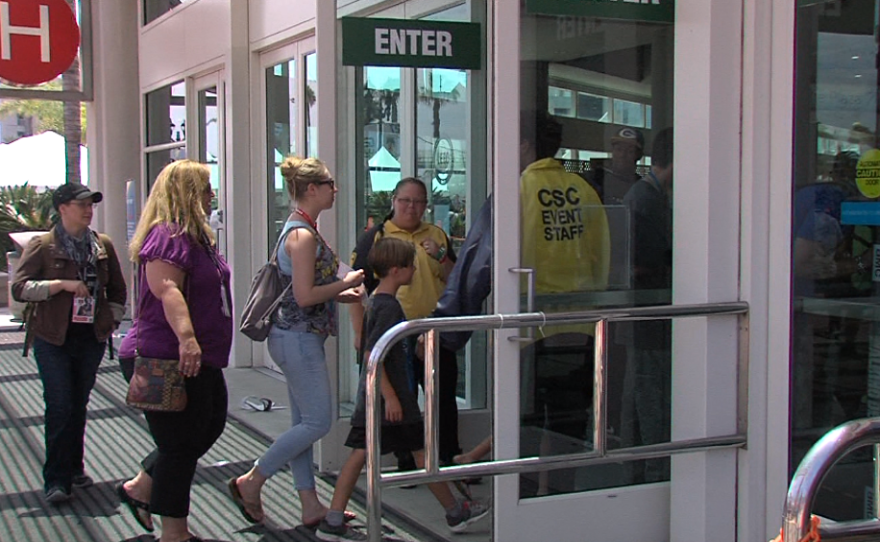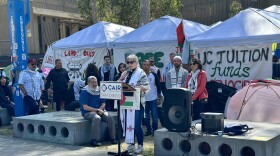The San Diego Central Library this year continues its tradition of melding Comic-Con and education. This weekend it will host teachers from Helix Charter High School in La Mesa who use comics to teach everything from algebra to French history.
The school’s adoption of comics started when teacher Ashley Golden had an English-language learner in her class.
“When we were teaching Bradbury’s ‘Fahrenheit 451,’ it’s a book that has a lot of metaphor and they were struggling with that,” she said. Bradbury describes a fire hose as a python and it was difficult for non-native speakers to grasp. “But there’s a comic book version that’s approved by Bradbury, the author, that had a lot of those metaphors in visual format. So it made it much more accessible for those students.”
Special Coverage: Comic-Con International San Diego
Golden and her colleagues soon discovered there was a much broader application.
“A lot of students say that they don’t like to read, and I always say, ‘No, that’s not true. You just don’t like to read what we’re giving to you to read,’” said psychologist Julie Damschen.
RELATED: Comic-Con For Educators: Ramona High Eases Into ‘The Odyssey’ With Graphic Novel
Teacher Ben Stone said he often uses pop culture to help explain history, including the rise of Napoleon.
“With ‘Star Wars,’ it starts off as a republic — OK, we’re going to vote for people who are going to represent us. And then there’s this person in the background who’s trying to take power,” Stone said. “And we talk about how, slowly but surely, someone like Napoleon gets power. And at first everyone thinks, ‘This guy is great. He’s awesome,’ and then he becomes the emperor.”
RELATED: Comic-Con For Educators: 'Its OK To Be Odd' And Other Lessons For College
Math teacher Chris Mosteller said he is hoping his time at Comic-Con will help him bring that kind of creativity to his math lessons.
“Math in high school level—in all levels—is going away from the traditional memorization and plug-n-chug type problems to the Common Core,” he said. “So what I’m here to do, basically, is to take away any type of comic stuff I can to bring into the classroom for word-type problems and application-type problems.”
Mosteller and his colleagues will present “Comics in Classrooms and Instruction” 2 p.m. Saturday at the downtown Central Library.
More Comic-Con Panels For Educators
Saturday, July 22:
Content Literacy: Teaching STEM with Comics
Illya Kowalchuck (director of education for Pop Culture Classroom), Brack Lee (Pop Culture Classroom), Nick Dragotta (Howtoons), MK Reed (Science Comics: Dinosaurs) and Alison Wilgus (Science Comics: Flying Machines) present a Q&A session about teaching with comics, as well as a list of some of the best graphic novels for supporting STEM topics in the classroom. Moderated by Tom Racine (Tell Tale Radio).
Graphic Novels in the High School Library
Cori McDonald (librarian, Ramona High School), Becky Harvey (library technician, Ramona High School), Erin Hill (language arts teacher, Ramona High School) and Emily Maehler (language arts teacher, Ramona High School) discuss their newly developed collaborations for using graphic novels in the classroom and library. Moderated by John Shableski (Will Eisner Studios, Udon Entertainment).
Superheroes and Comics Can Transform Learning
A group of educators, researchers and creators discuss how comics can be used to enhance literacy and STEM education and why our brains may be uniquely wired to learn from comics. Featuring Jorge Cham (author and creator, PhD Comics), Rebecca Thompson (creator, APS Spectra Comics), Jeff Barbanell (president, Scholastic Innovations, Inc.), Josh Elder (executive director, Reading with Pictures) and Neil Cohn (assistant professor, Tilburg University). Moderated by Russell Shilling (Digital Promise, former DARPA PM).
Comics in Classrooms and Instruction
San Diego teachers discuss the importance of the arts in classrooms, specifically how comics can be used as cross-curricular tools, as bridge-gaps for ELL/struggling readers and to increase engagement. Featuring Ashley Marie Golden (art and English), Ben Stone (AP world and European history), Julie Damschen (AP psychology) and Chris Mostellar (math).
Inspiring Young Readers Through Graphic Novels
Beth Duncan, Lisa Harrison, Nichole Santangelo (teachers, Rancho Minerva Middle School), Amy Pitotti (teacher, David A. Brown Middle School), Lisa Ferneau-Hayes (senior librarian, Oceanside Public Library), Erin Nakasone (librarian I in youth services, Oceanside Public Library), Matthew Shoemaker (international educator) and Yukiko Chavez (library media technician, Rancho Minerva Middle School) along with three middle and high school students will discuss how graphic novels have become a gateway into the world of literacy through art, teen book buddy programs and mentoring/modeling.
Sunday, July 23:
Comics Arts Conference #13: Other Voices, Other Histories
Braeden Jones (University of Iowa) discusses the ways in which creators of selected didactic comics from Spain, the U.S. and Mexico modified complicated historical facts to present different ideological interpretations of the conquest of Tenochtitlan. Clarissa Goldsmith (Arizona State University) draws from narratological and borderland theory to analyze how Relampago, the Invincible Man and El Gato Negro reimagine the superhero genre to address social concerns within the Chicanx community. Dwain C. Pruitt (University of Louisville) traces the development of DC Comics's black heroes as pseudo-Muslims, from the misunderstanding of African American cultural politics in the 1960s and 1970s to African American creators of the Milestone Comics imprint, and highlights 1978's Superman vs. Muhammad Ali as a turning point.
Discover Creating Comics with Kids: An Interactive Workshop
Comic books are for everyone, and that includes the youngest readers just learning about the world of four-color fantasy. The creators of BOOM! Studios's upcoming The Not-So Secret Society graphic novel present an interactive workshop where you and your school-age children will get hands-on experience in making their own comic.
Education pros explore current identity issues in pop culture and show you how to utilize this intersection to serve students at your college or university. Panelists include Emily Sandoval (USC), Alex Belisario (UC Santa Cruz), Patricia Chau Nguyen (UCLA), Danny Slatkin (UCLA) and Brian Arao (UC Santa Cruz). This panel is one of four specifically focused on college and university staff, faculty, and students.
The Secret Origin of Good Readers
Get tips and insights on using comic creation tools to increase learning in your classroom. Special guests: New York Times and USA Today bestseller Anne Elizabeth (Once a SEAL), writer/editor Dave Elliot (The Weirding Willows), librarian Karen Green (Columbia University), New York Times bestseller Marjorie M. Liu (Monstress) and retailer Mimi Cruz (Night Flight Comics).
GeekEd #2: Shall We Play a Game?
A panel of game scholars discuss how building better games, identifying the biases within them, and the act of "play" helps people empathize with others and provides them with a guideline for this work on college campuses. This panel of scholars will explore the intersection of games, learning and inclusivity in the context of curriculum development, activism, policy, history and game design. Panelists include Constance Steinkuehler (UC Irvine; Senior Policy Analyst, White House Office of Science and Technology Policy 2011-2012), Bonnie Ruberg (UC Irvine), Kurt Squire (UC Irvine), Amanda Cullen (UC Irvine) and Aaron Trammell (UC Irvine).
GeekEd #3: Caring for the Nerd Mind
Teachers, education administrators and student affairs professionals are being called to respond to a wide variety of mental health concerns across the education landscape, with students today managing greater educational debt, digital identities and high expectations for academic performance. This panel of educators and mental health experts share how they have applied their passion for fandom and the lessons they've learned from superheroes to develop new best practices for promoting mental health in schools and on campuses. Panelists include Andrea Letamendi, Brent Crandal, Alfred Day (UC Berkeley), Adrian Perdue (UCLA) and Brian MacDonald (UCLA).
GeekEd #4: Comics in Secondary Education
Teachers from California schools discuss incorporating comics, including Ms. Marvel, Batman, Maus, Persepolis and Pride of Baghdad, into English, world history, psychology and special education courses. Panelists include Jason Goldman-Hall (Pioneer High School), Alexander Hung-Diep (Andrew Hill High School), Jenny Kim (Pioneer High School), Courtney Arndt (Independence High School) and Michelle Kittel (Rocketship Academy).
A look at how heroic comics, movies and toys can inspire girls to be more confident and successful by combatting harmful gender norms that can hold them back. A panel of experts including Alaina Huffman (Supernatural, Smallville), Audrey Kearns (Geek Girl Authority), Cassandra Pelham (senior editor at Graphix and Scholastic Press), Dr. Janina Scarlet (Superhero Therapy) and Jenna Busch (Stan Lee's World of Heroes, Legion of Leia) will participate in a session moderated by John Marcotte (founder of Heroic Girls).
Source: Comic-Con International






